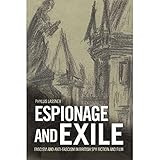Espionage and Exile : Fascism and Anti-Fascism in British Spy Fiction and Film / Phyllis Lassner.
Material type: TextPublisher: Edinburgh : Edinburgh University Press, [2022]Copyright date: ©2016Description: 1 online resource (272 p.) : 12 B/W illustrationsContent type:
TextPublisher: Edinburgh : Edinburgh University Press, [2022]Copyright date: ©2016Description: 1 online resource (272 p.) : 12 B/W illustrationsContent type: - 9781474401104
- 9781474401111
- 823.087209
- PR830.S65 L37 2016
- PR830.S65
- online - DeGruyter
- Issued also in print.
| Item type | Current library | Call number | URL | Status | Notes | Barcode | |
|---|---|---|---|---|---|---|---|
 eBook
eBook
|
Biblioteca "Angelicum" Pont. Univ. S.Tommaso d'Aquino Nuvola online | online - DeGruyter (Browse shelf(Opens below)) | Online access | Not for loan (Accesso limitato) | Accesso per gli utenti autorizzati / Access for authorized users | (dgr)9781474401111 |
Browsing Biblioteca "Angelicum" Pont. Univ. S.Tommaso d'Aquino shelves, Shelving location: Nuvola online Close shelf browser (Hides shelf browser)

|

|

|

|

|

|

|
||
| online - DeGruyter The Languages of Business : An International Perspective / | online - DeGruyter Sasanian Persia : Between Rome and the Steppes of Eurasia / | online - DeGruyter The Politics of Romanticism : The Social Contract and Literature / | online - DeGruyter Espionage and Exile : Fascism and Anti-Fascism in British Spy Fiction and Film / | online - DeGruyter Human Trafficking : The Complexities of Exploitation / | online - DeGruyter Human Rights and Cultural Diversity : Core Issues and Cases / | online - DeGruyter Hobbes and Modern Political Thought / |
Frontmatter -- Contents -- Acknowledgments -- Introduction: Exile - The Heart of the Secret World -- 1. Eric Ambler: Espionage Chronicler of the 1930s -- 2. Double Agency: Women Writers of Espionage Fiction -- 3. Leslie Howard: Propaganda Artist -- 4. John le Carré's Never-ending War of Exile -- Conclusion -- Bibliography -- Index
restricted access online access with authorization star
http://purl.org/coar/access_right/c_16ec
Analyses mid-twentieth century British spy thrillers as resistance to political oppressionEspionage and Exile demonstrates that from the 1930s through the Cold War British writers Eric Ambler, Helen MacInnes, John le Carré, Pamela Frankau and filmmaker Leslie Howard combine propaganda and popular entertainment to call for resistance to political oppression. Their spy fictions deploy themes of deception and betrayal to warn audiences of the consequences of Nazi Germany's conquests and later, the fusion of Fascist and Communist oppression. With politically charged suspense and compelling plots and characters, these writers challenge distinctions between villain and victim and exile and belonging by dramatising relationships between stateless refugees, British agents, and most dramatically, between the ethics of espionage and responses to international crisis.Key FeaturesThe first narrative analysis of mid-twentieth century British spy thrillers demonstrating their critiques of political responses to the dangers of Fascism, Nazism, and CommunismCombines research in history and political theory with literary and film analysisAdds interpretive complexity to understanding the political content of modern cultural productionOriginal close readings of the fiction of Eric Ambler, John Le Carré and British women spy thriller writers of World War II and the Cold War, including Helen MacInnes, Ann Bridge, and Pamela Frankau as well as the wartime radio broadcasts and films of Leslie Howard
Issued also in print.
Mode of access: Internet via World Wide Web.
In English.
Description based on online resource; title from PDF title page (publisher's Web site, viewed 02. Mrz 2022)


